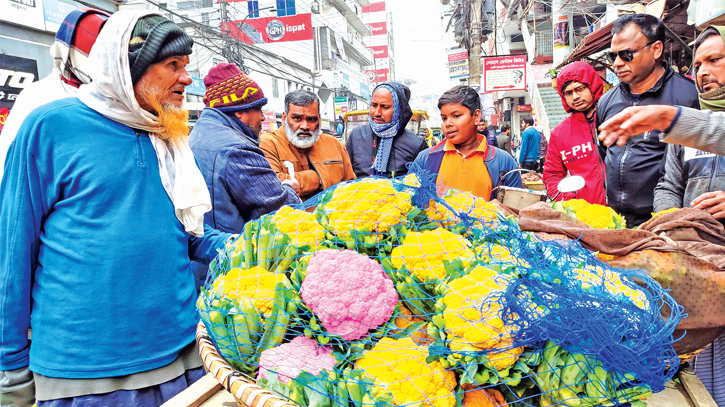
Photo : Messenger
In an unexpected development, colorful cauliflowers are now being cultivated in Pabna, contrary to the traditional white variety typically grown by farmers. Farmer Aslam Ali, hailing from Bil Bhaduria village in Pabna Sadar upazila, has taken the initiative to cultivate these vibrant cauliflowers.
Yellow and purple cauliflowers have adorned the vegetable shops of Pabna city and other markets across the district, captivating the attention of shoppers. Sales have soared as these colorful varieties attract customers the moment they step into the vegetable shops.
Many buyers, intrigued by these unique cauliflowers, are purchasing them for the first time out of curiosity and as a hobby. With smiles on their faces, customers eagerly take home these colorful floral specimens. Retail markets are witnessing brisk sales, with Tk 80-100 per kilogram of these vibrant cauliflowers being sold regularly.
During the conversation, farmer Aslam Ali revealed, "Last year, my two daughters stumbled upon videos showcasing colorful cauliflowers on YouTube. Intrigued by what they saw, they approached me with a request to cultivate these unique cauliflowers. I, too, was captivated by the idea after watching the video. Thus, I decided to embark on this venture. Initially, I visited the Pabna Sadar Upazila Agriculture Office seeking guidance, but unfortunately, they couldn't assist me with the matter."
"Undeterred, I reached out to the individual who had created the YouTube video. They advised me to contact authorities in Dhaka. Following their suggestion, I got in touch with a seed store in Dhaka, procured the necessary seeds, and commenced planting," Ali elaborated.
Farmer Almas Ali further shared, "I planted over 6 thousand cauliflower plants in my one and a half bigha land, and all of them thrived remarkably well. Now, every day, I harvest cauliflowers from my land and transport them directly to the market, where I sell them to various shops at wholesale prices. I typically sell them wholesale for Tk 60-65 per kilogram, while they fetch Tk 80-100 per kilogram in the market. The response to my yellow and purple cauliflower has been overwhelmingly positive, which has been immensely gratifying."
Omar Ali, father of Aslam Ali, expressed his initial concerns, stating, "At first, I was apprehensive about the success of this endeavor. However, my son's cultivation on one and a half bigha of land has proven to be remarkably successful. The cauliflowers have grown impressively large. In terms of cultivation costs, there hasn't been much variation compared to other varieties. The only difference lies in the slightly increased requirement for organic fertilisers."
He continued, "Many people have been visiting our land to witness the colorful cauliflowers firsthand. Some are even capturing photographs, while others are making purchases. This overwhelming response has brought us immense satisfaction and joy."
Monirul Islam, a vegetable seller in Pabna city, remarked, "The colorful cauliflower is selling exceptionally well." While the traditional white cauliflower fetches Tk 50-60 per kilogram, the colored cauliflower commands a higher price, ranging from Tk 80-100 per kilogram. This surge in demand has been driven by the heightened interest among buyers. Many customers have expressed satisfaction with the taste of the colorful cauliflower.
"I personally sell 50-60 piece of this vibrant cauliflower every day," added Islam.
Deputy Director of the Directorate of Agricultural Extension, Pabna, Jamal Uddin, shed light on the matter, stating, "These colorful cauliflowers are of the Japanese variety. Their cultivation commenced in our country only two years ago. While Pabna traditionally cultivated only white cauliflowers, this marks the first instance of cultivating colored cauliflowers in the region."
He further emphasised, "In the future, if anyone wishes to cultivate such colored varieties, the Agricultural Extension Office will provide all necessary support and cooperation."
Messenger/Fameema








